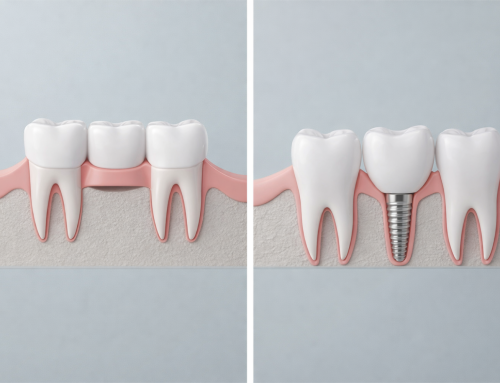That nagging toothache? It might be more than just sensitivity. Tooth pain is your body’s way of signaling that something deeper could be wrong. Often, it’s one of several types of oral infections that need timely attention.
At Somerset Dental on James, we help patients understand common oral health problems, what their symptoms mean and how to treat them before they become more serious. If you’re dealing with pain, swelling, or sensitivity, this guide can help you spot the warning signs and know when to call your family dentist in Somerset.
TL;DR– What That Tooth Pain Could Be Telling You
Toothaches and gum discomfort aren’t just annoying—they’re often signs of underlying issues like oral infections. Here are the most common types to watch for:
- Tooth Abscess: Deep infection in or around a tooth—often painful and urgent
- Gingivitis: Early-stage gum inflammation that’s fully reversible
- Periodontitis: Advanced gum disease that can lead to tooth loss
- Pericoronitis: Infection around partially erupted teeth (often wisdom teeth)
- Canker Sores vs. Viral Infections: Small ulcers vs. recurring viral conditions
If you’re noticing pain, swelling, or sensitivity, don’t wait—oral infections can spread quickly. Somerset Dental offers compassionate, expert care to treat infections and protect your long-term health. Book your exam today.
What Is an Oral Infection?
An oral infection is caused by harmful bacteria that invade the teeth, gums, or surrounding tissues. Left untreated, these infections can spread, lead to tooth loss, or even affect your overall health.
While many infections start small, even mild discomfort shouldn’t be ignored—especially when it comes to your mouth. Early diagnosis is key to fast, comfortable treatment and long-term oral health.
Common Types of Oral Infections
There are several types of oral infections, each with different causes and symptoms.
1. Tooth Abscess (Periapical or Periodontal)
A tooth abscess is a pocket of pus caused by a bacterial infection. It may form inside the tooth (periapical) or in the gums around the root (periodontal).
- Symptoms:
- Throbbing pain or pressure
- Facial swelling
- Bad taste or odor
- Fever or swollen lymph nodes
An untreated abscess can lead to jawbone damage or systemic infection. Root canal treatment or extraction may be needed to remove the infection and preserve oral health.
2. Gingivitis
Gingivitis is a mild but common form of gum disease caused by plaque buildup along the gumline.
- Symptoms:
- Red, puffy, or bleeding gums
- Bad breath
- Sensitivity during brushing or flossing
Gingivitis is reversible with professional cleanings and improved home care. But if left untreated, it can progress to more serious infections like periodontitis.
3. Periodontitis
Periodontitis is an advanced gum infection that affects the bone and connective tissues supporting your teeth.
- Symptoms:
- Receding gums
- Loose teeth
- Chronic bad breath
- Pus or gum abscesses
This infection can lead to tooth loss and has been linked to heart disease and diabetes. Treatment may involve deep cleanings (scaling and root planing), antibiotics, or periodontal therapy. Learn the 7 types of periodontal diseases you should know about.
4. Pericoronitis
Pericoronitis happens when bacteria accumulate around a partially erupted tooth—often a wisdom tooth.
- Symptoms:
- Swollen, tender gum near the affected tooth
- Difficulty chewing or opening the jaw
- A bad taste or smell
If the gum tissue becomes trapped over the tooth, infection can worsen and affect surrounding tissue. In some cases, removal of the tooth is recommended.
5. Canker Sores vs. Oral Viral Infections
Canker sores are small, non-contagious ulcers that heal on their own. However, persistent or painful sores could be a sign of a viral infection such as herpes simplex.
- Symptoms:
- Painful blisters or ulcers
- Recurring outbreaks
- Tingling or burning before appearance
A dentist can help distinguish between harmless sores and conditions that require medical care.
When Tooth Pain Means It’s Time to Call the Dentist
Tooth pain that lingers, worsens, or comes with swelling, fever, or discharge should never be ignored. These signs often point to infection, and catching it early makes a big difference.
If you’re unsure what’s causing your symptoms, we recommend a gentle exam with a trusted dentist in Calgary to get clarity and relief.
How to Prevent Oral Infections Before They Start
The good news is that most oral infections are preventable with solid habits and regular dental visits.
Our top prevention tips:
✅ Brush twice daily with fluoride toothpaste
✅ Floss and/or Waterpik daily to remove bacteria between teeth
✅ Visit your family dentist every six months for cleanings and checkups
✅ Don’t ignore early signs like gum bleeding, bad breath, or tooth sensitivity
Prevention helps you to avoid discomfort and protect your overall health.
Don’t Wait on That Toothache
A small ache can lead to a big problem if left untreated. By understanding the types of oral infections and their signs, you can take action early and protect your smile for years to come.
At Somerset Dental on James, we’re here to help with expert care, modern technology, and a gentle approach that puts you at ease.
Experiencing tooth pain or gum issues? Book your visit today and let us help you feel better.





